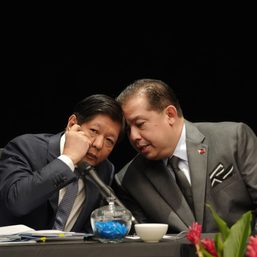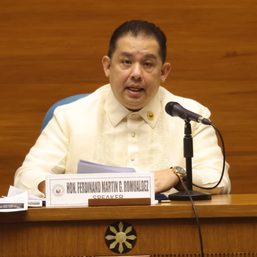SUMMARY
This is AI generated summarization, which may have errors. For context, always refer to the full article.

MANILA, Philippines – The legal troubles of SMNI, a platform known for red-tagging and peddling disinformation, has divided the opinion of free speech advocates. One side feels vindicated over the suspension of shows, including that of former president Rodrigo Duterte’s; the other is wary of the same tactics that they say had been used against legacy media.
After SMNI hosts were investigated by the House of Representatives over a false report on Speaker Martin Romualdez’ travel funds, the National Telecommunications Commission (NTC) suspended the network for 30 days. Earlier, the Movie and Television Review and Classification Board (MTRCB) suspended for 14 days the SMNI programs hosted by former president Duterte and his Palace’s former communications assistant secretary Lorraine Badoy.
SMNI is owned by doomsday preacher Apollo Quiboloy, who is wanted in the United States for sex trafficking of children.
There is a dominant online opinion supporting moves to suspend SMNI, seeing it as vindication for what the Duterte government did to media companies, such as taking away the franchise of media giant ABS-CBN, ordering the revocation of Rappler’s license, and blocking the website of Bulatlat.
But at least two media groups have warned against celebratory comments.
The National Union of Journalists of the Philippines (NUJP) said that the tactics used against SMNI is “as dangerous then as it is now.”
“The Union’s issues with SMNI aside, this suspension by the NTC is reminiscent of the previous administration’s attempts to weaponize the law and muzzle media,” said NUJP.
The NTC’s suspension order was based on an earlier resolution of the House on SMNI’s alleged violation of franchise conditions. It was mainly related to Romualdez’ gripes, and not red-tagging.
The Center for Media Freedom and Responsibility (CMFR) said in an editorial: “The congressional fuss over offenses of the SMNI hosts is politics at work and little else. The probe and the penalties imposed on Jeffrey Celiz and Lorraine Badoy have little to do with the values of civic discourse.”
What SMNI can be sued for
To these media groups, currently the most agreeable option to resolve the SMNI problem is to sue them for red-tagging, an act linking people and groups to the armed rebellion without proof. Red-tagged people have been killed during the Duterte government.
But that is no easy feat since there is no law in the Philippines that criminalizes red-tagging, driving victims to find other laws to go after the broadcast network. The likes of journalist Atom Araullo and former lawmaker Teddy Casiño opted for a civil suit, careful not to use other criminal law, such as libel, which has also been weaponized against the press.
As the NUJP notes, the congressional inquiry which led to the NTC suspension was not about SMNI’s red-tagging. “SMNI, its consultants, and its talents should be held accountable for peddling disinformation and hate speech, but should be accountable for those offenses and not for simply offending a member of Congress,” said the NUJP.
The Movement Against Disinformation (MAD) filed a complaint with the NTC against SMNI in 2022 on behalf of the mothers of disappeared activists, whose convicted captor, former general Jovito Palparan, was interviewed by Badoy. They framed it as a violation of the law that granted SMNI its franchise, Republic Act 11422, where Section 4 says the network must not disseminate deliberately false information.
MAD president Tony La Viña told Rappler, “Obviously we are for the revocation of SMNI’s license. We filed a case vs SMNI on behalf of the parents of the two missing UP students whom Palparan red-tagged. Red-tagging creates a clear and present danger to people and can be censored or restrained.”
The Bill of Rights and jurisprudence on libel and other constitutional free speech cases have set a very high bar of protection against content regulation. Any regulation that would restrict speech has to be very narrow, and must prove that it will lead to imminent and high level of harm. This has protected newsrooms from raids during the administration of president Gloria Macapagal Arroyo, and gives space for journalists to be wrong as long as they prove there was not reckless disregard on their part.
But are SMNI hosts legitimate journalists worthy of protection, ask some? Classifying who the “real” journalists are will also be a dangerous task, because it could lead to a standard such as permits and licenses, which can negatively affect companies like ABS-CBN, which has no franchise, and experienced journalists who have no company affiliations.
CMFR says: “The actions done by the lawmakers should send chills down libertarian spines. Our lawmakers have now shown themselves ready to punish opposing views.”
Protecting media from politicians
While the House has become antagonistic towards SMNI, the Duterte supporters in the Senate are going all out for Quiboloy’s network.
Senators Imee Marcos and Robin Padilla are crying press freedom and due process – two democratic values invoked by the individuals and groups who were repressed by the former Duterte government, which they supported.
“Sino ang takot sa SMNI? Anong mga media entities ang mananatiling nagtataguyod ng kalayaan ng pamamahayag, pananalita, at pag-iisip?” said Senator Marcos. (Who is afraid of SMNI? Which media entities remain to uphold the freedom to report, to speak, and to think?)
Padilla said the NTC’s suspension order “is a transgression of SMNI’s right to due process, which will result in serious and irreparable damage to it and its employees no less.”
CMFR, which acts as a watchdog for responsible and ethical reporting, advised that news coverage of SMNI should still reflect “natural advocacies that are embedded in our value system.” This includes calling out the fact that Congress’ power over media franchise “betrays” the constitutional protection that no law shall be passed abridging free speech.
“This latest case has different players, but it demonstrates quite effectively the wisdom of protecting the media from politicians. In most democracies, independent commissions decide franchise matters,” said CMFR.
“Media workers have the right to feel vindicated or even celebrate these developments but we cannot lose sight of how these moves have been used against ABS-CBN, Bulatlat, and PinoyWeekly. Similar weaponization of the law has been used against Rappler and the Philippine Daily Inquirer,” said the NUJP. – Rappler.com
Add a comment
How does this make you feel?








![[Just Saying] Ted Failon, press freedom, and the Supreme Court](https://www.rappler.com/tachyon/2024/07/20240709-ted-failon-press-freedom-supreme-court.jpg?resize=257%2C257&crop=296px%2C0px%2C720px%2C720px)

![[OPINION] Rodrigo Duterte and his ‘unconditional love’ for China](https://www.rappler.com/tachyon/2024/04/rodrigo-duterte-xi-jinping-august-2019.jpeg?resize=257%2C257&crop=91px%2C0px%2C900px%2C900px)



![[The Slingshot] Lito Patay’s 4 hours and 38 minutes of infamy](https://www.rappler.com/tachyon/2024/07/Lito-Patay-4-hours-infamy-July-19-2024.jpg?resize=257%2C257&crop=233px%2C0px%2C720px%2C720px)
There are no comments yet. Add your comment to start the conversation.